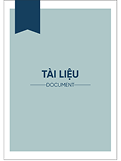Tài liệu
Impact of Subsidy Schemes on the Economic Well-Being of Households in Vietnam

Xem mô tả
184
Xem & Tải
9
Tóm tắt
This paper uses the Propensity Score Matching method (PSM) to determine the criteria of eligibility for production and income subsidies and the Diffrence-in-Diffrence method (DID) to evaluate the impact of these policies on households’ economic well-being in Vietnam. The empirical results indicate that though these policies have not contributed to a clear economic well-being improvement of the participating households, their impacts tend to move in a positive direction. It should be noted that though these policies do not make the income/expenditure of the participating households increase, they help increase the income component from agricultural production signifiantly, especially for the group receiving production subsidies, and at the same time increase spending on durable goods and health care services in comparison with nonparticipating households.
Mô tả
economic management
Tác giả
Nguyen, Hoang Oanh
Nguyen, Hong Ngoc
Ho Dinh Bao
Người hướng dẫn
Nơi xuất bản
Nhà xuất bản
Kinh Tế Quốc Dân
Năm xuất bản
2017
ISBN
1893-0020
ISSN
Từ khóa chủ đề
Diffrence-in-diffrence (DID) , Propensity Score Matching (PSM) , income subsidy , production subsidy , households’ economic well-being.
Trích dẫn
Bộ sưu tập
Tệp tin

Article 3_JED_Vol 19_Number 1.pdf
D:\NEU_DSpace\tapchitienganh
Dung lượng: 392.4 KBĐịnh dạng: pdf
Lượt xem: 2 Lượt tải: 7
